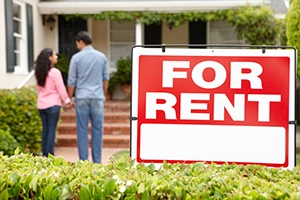Virginia rental restrictions can shape the way a homeowners association operates. Some communities welcome rentals, while others fear they might disrupt the balance that long-term owners bring. Boards must understand what the law allows, what their governing documents say, and what restrictions they can actually enforce.
The Importance of Virginia Rental Restrictions

Homeowners associations are responsible for enhancing curb appeal and preserving property values. One of the ways these communities achieve these goals is by enforcing strict rules, including rental restrictions.
Virginia rental restrictions are essential because they allow the board to limit the issues that come with transient residents. More rentals can mean more cars, heavier use of amenities, and more security risks. Tenants also don’t always understand or respect the rules the way owners do.
Still, many homeowners want the option to rent out their units, especially if they only use them as vacation homes. It’s all about balance when it comes to imposing rental restrictions. Board members must juggle strict regulations with understanding to successfully protect property values and preserve the character of the neighborhood while keeping residents happy at the same time.
What are the HOA Rental Restrictions in Virginia?
When it comes to rental rules, Virginia law provides a clear framework that associations must follow. Boards can’t simply decide to create whatever rules they want.
Section 55.1-1806 of the Virginia Property Owners’ Association Act and Section 55.1-1973 of the Virginia Condominium Act both set limits on what associations can and cannot do. These laws protect owners from unreasonable restrictions while still giving boards authority to manage rentals responsibly.
Some of the most critical restrictions under these statutes include:
1. Prohibition of Rentals
Associations can’t prohibit or condition the right of an owner to rent their property, unless that restriction is expressly stated in the declaration or otherwise authorized by law. This means the board can’t suddenly ban rentals altogether once people already own their homes. If the declaration allows rentals, then they must continue to be allowed, and the board must work within that framework.
2. Charging Fees
Boards can’t charge rental fees, application fees, or processing fees exceeding $50 during the lease term. They also can’t add ongoing rental fees or charges that are not authorized under Virginia law. The board can collect what the law says, but it can’t invent new fees as a way to discourage rentals or generate extra income.
3. Deposits
Associations are not allowed to require deposits from owners or from tenants. Deposits can only be set by the owner and tenant in their private lease arrangement. The board can’t step in to demand money for itself under the name of a deposit.
4. HOA-Prepared Lease

The board can’t force an owner to use a lease form that the association wrote. Additionally, it can’t require an owner to add its own addenda to a lease. Owners have the right to use their own lease documents as long as those leases don’t conflict with state law or the governing documents.
5. Tenant Eviction
Boards don’t have the authority to evict tenants. Only owners can do that, and only by following the proper legal process. The association also can’t require owners to give the board a power of attorney to carry out evictions on their behalf. The board can still enforce rules directly against tenants, but eviction power remains with the property owner.
6. Tenant Information
Associations can require owners to provide tenant information, including names, contact details, and vehicle information. The board can also ask for an acknowledgment that tenants understand and consent to follow the rules. This ensures the association knows who is in the community and provides the board with a means to maintain clear communication.
Common HOA Short-Term Rental Restrictions
HOA short-term rental regulations have become one of the most common issues for associations in Virginia. Boards must never forget that their rules must comply with both state laws and the governing documents. That said, many associations adopt rules that go beyond state law to preserve stability.
1. Total Ban
Some associations attempt a total ban, and this is one of the strictest Virginia rental restrictions. Total bans usually only stand if they were part of the declaration from the very beginning. Otherwise, state law will not allow the board to impose them later. Boards should consider total bans when they believe short-term rentals threaten the safety or the character of the community.
2. Rental Cap
Rental caps limit the percentage of homes that can be rented at one time. This is another form of Virginia rental restrictions that boards turn to when they want balance.
For example, a community might allow only 20 percent of its units to be rentals at any given time. Once the cap is reached, no new rentals can be approved until one expires. This provides the board with control over numbers while still allowing owners to rent.
3. Rental Duration

Rental duration rules set a minimum lease term. Boards often require six months or one year. This is because long-term tenants are more invested in the community, while short-term renters can create constant turnover and disruption. Associations prefer long-term rentals because they support stability and reduce complaints.
4. Tenant Information
Boards commonly require owners to provide tenant information. This includes names, contact details, and even vehicle records. The reason is simple — the board must know who is in the community to communicate effectively and enforce rules.
5. Lease or Rental Agreement
Associations may require a copy of the lease or a summary of its terms. This helps confirm compliance with rules like rental caps or minimum durations. It also gives the board documentation it can use if problems arise.
6. Tenant Adherence to Rules
Tenants are bound by the same rules as owners. This means parking, noise, use of amenities — everything applies equally. The board must enforce the rules fairly and consistently. Board members should never show bias against tenants just because they are not owners. That said, owners are still responsible for making sure their tenants comply.
Beneficial to Associations
Virginia rental restrictions give boards the tools they need to balance owner rights with community stability. By understanding state statutes and enforcing rules through governing documents, the board can protect property values and preserve harmony. Compliance with the law also prevents potential liability.
Keymont Community Management offers expert management services, including legal compliance, to associations in Virginia, Maryland, and Washington, DC. Call us today at 703.752.8300 or request a proposal to start your journey!
RELATED ARTICLES:
- Know the Rules: Virginia HOA Laws Every Resident Should Understand
- Unenforceable HOA Rules In Virginia
- Understanding HOA Fees: What Are Homeowners Paying For?



